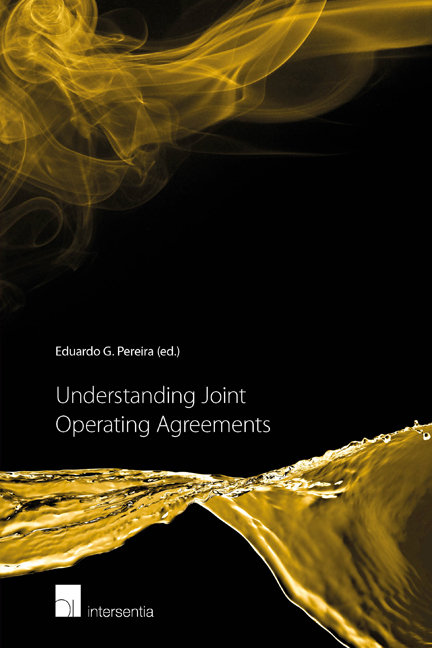Book contents
- Frontmatter
- Contents
- List of Abbreviations
- List of Authors
- Introduction
- PART I CONSIDERATIONS PRIOR TO ENTERING INTO A JOA
- 1 Bribery Laws and Compliance
- 2 The Relationship with Other Joint Venture Agreements
- 3 Unitisation and Unit Operating Agreements
- 4 Key Issues Relating to JOAs in Civil Law Countries
- 5 The Relationship between a JOA and a Host Government Instrument
- 6 Decommissioning Obligations, Practices and Procedures
- 7 Standards and Practices in JOAs across the Petroleum Industry
- 8 Modifying the Standard JOA to Accommodate Unconventional Petroleum Projects
- PART II SETTING UP A JOA
2 - The Relationship with Other Joint Venture Agreements
from PART I - CONSIDERATIONS PRIOR TO ENTERING INTO A JOA
Published online by Cambridge University Press: 15 December 2017
- Frontmatter
- Contents
- List of Abbreviations
- List of Authors
- Introduction
- PART I CONSIDERATIONS PRIOR TO ENTERING INTO A JOA
- 1 Bribery Laws and Compliance
- 2 The Relationship with Other Joint Venture Agreements
- 3 Unitisation and Unit Operating Agreements
- 4 Key Issues Relating to JOAs in Civil Law Countries
- 5 The Relationship between a JOA and a Host Government Instrument
- 6 Decommissioning Obligations, Practices and Procedures
- 7 Standards and Practices in JOAs across the Petroleum Industry
- 8 Modifying the Standard JOA to Accommodate Unconventional Petroleum Projects
- PART II SETTING UP A JOA
Summary
INTRODUCTION
Success in the international oil and gas industry has always required cooperation with other parties, whether they be contractors, governments or competitors. Historically, oil and gas companies have formed joint venture groups or consortia as vehicles to conduct exploration, development and production activities. This is done primarily to reduce risk, share expertise and in part to diversify the production portfolio of a single company. Such cooperation has become a dominant and unique feature of upstream petroleum operations.
The JOA is undoubtedly the most prominent and familiar cooperation agreement seen in the international upstream petroleum industry. However, prior to any JOA coming into force (or in parallel to the JOA) the regulation of various activities involving some or all participants for which the JOA does not cater may require the execution of additional agreements dealing with joint venture or cooperation issues.
This chapter will explore, in brief, certain other joint venture agreements born out of a commercial need for competitors (and sometimes other stake holders) to collaborate in the exploration and development of hydrocarbons, and how such joint venture agreements interact with the JOA.
This chapter does not discuss considerations relating to, among others, competition, taxation and insurance. Such matters may need to be taken into account when entering into the arrangements described below.
AREA OF MUTUAL INTEREST AGREEMENTS
OVERVIEW
An area of mutual interest agreement (AMIA) is an agreement commonly used in the upstream oil and gas industry when two or more parties have identifi ed, usually at the exploration stage, that the same area of acreage (whether it be off shore or onshore) is of interest to them both.
The AMIA is a form of joint venture agreement brought about by the commercial need for parties to work together to explore and exploit an area of mutual interest and its purpose is to establish the rights and obligations of the parties regarding the relevant acreage.
As with other joint venture instruments the AMIA is a cooperation agreement aimed at achieving a shared commercial objective. The basis for entry into an AMIA may include the sharing of financial risks, expertise and data and the pooling of knowledge of the co-venturing parties with respect to a block or in anticipation of bidding rounds.
- Type
- Chapter
- Information
- Understanding Joint Operating Agreements , pp. 27 - 42Publisher: IntersentiaPrint publication year: 2016



